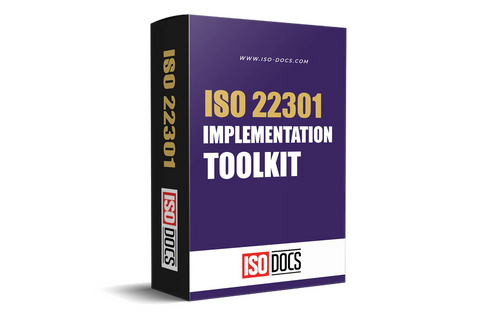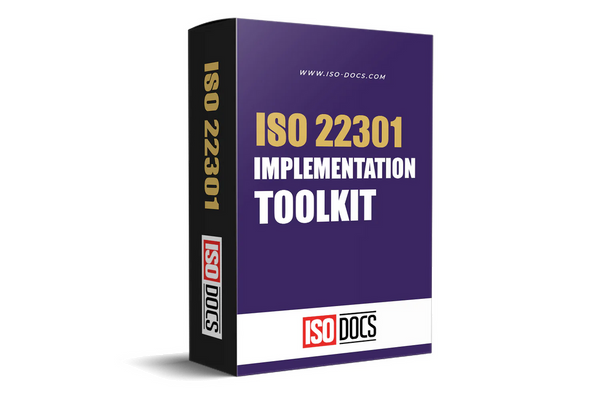ISO 22301:Management Review Meeting Agenda PPT
In the dynamic landscape of business continuity management, adherence to international standards is pivotal. ISO 22301, the globally recognized standard for Business Continuity Management Systems (BCMS), ensures organizations are well-equipped to navigate disruptions seamlessly.
As an integral part of ISO 22301, the Management Review Meeting serves as a strategic checkpoint.This PowerPoint presentation aims to provide a comprehensive agenda for these crucial meetings, empowering organizations to evaluate the effectiveness of their BCMS implementation.
Importance of ISO 22301:Management Review Meeting Agenda PPT
Strategic Evaluation:
- The agenda facilitates a systematic and strategic evaluation of an organization's Business Continuity Management System (BCMS) as per ISO 22301 standards.
- It serves as a dedicated platform to assess the effectiveness and efficiency of implemented measures in the face of evolving threats and disruptions.
Continuous Improvement:
- The Management Review Meeting Agenda acts as a blueprint for fostering a culture of continuous improvement within the BCMS framework.
- By systematically reviewing and analyzing performance, organizations can identify areas for enhancement and refinement.
Risk Management:
- It provides a structured approach to assess the evolving risk landscape and ensures that the BCMS is adaptive to emerging threats.
- Through agenda items dedicated to risk analysis, organizations can stay proactive in mitigating potential disruptions.
Compliance Assurance:
- The agenda serves as a guide to ensure that the organization remains in compliance with ISO 22301 standards.
- It aids in tracking compliance milestones and addressing any deviations promptly.
Stakeholder Communication:
- A well-organized agenda facilitates effective communication among stakeholders, ensuring that everyone is aligned with the BCMS goals and objectives.
- It provides a platform to discuss challenges, achievements, and future strategies transparently.
Resource Optimization:
- Through agenda items focused on resource allocation and utilization, the meeting aids in optimizing resources for better resilience.
- This includes assessing the adequacy of resources and making informed decisions on resource allocation for BCMS activities.
Documentation and Record Keeping:
- The agenda emphasizes the importance of maintaining comprehensive documentation and records, aligning with ISO 22301 documentation requirements.
- This ensures a robust audit trail and supports evidence-based decision-making during the review process.
Leadership Involvement:
- The agenda encourages active involvement of leadership in the review process, emphasizing their commitment to the success of the BCMS.
- This involvement fosters a culture of responsibility and accountability throughout the organization.
Emergency Response Preparedness:
- Specialized agenda items focus on evaluating the organization's preparedness for emergency responses, ensuring that teams are ready to act swiftly in times of crisis.
- This contributes to minimizing downtime and protecting critical business functions.
Demonstration of Organizational Resilience:
- Ultimately, the Management Review Meeting Agenda showcases the organization's commitment to resilience and its ability to adapt and thrive in the face of disruptions.
- It becomes a demonstration of the organization's proactive stance in managing risks and ensuring business continuity.
Key components of ISO 22301:Management Review Meeting Agenda PPT
Review of Previous Actions and Decisions:
- Dedicate a section to review actions and decisions from the previous meeting.
- Assess the status of implementation and address any outstanding issues.
Performance Metrics and Key Indicators:
- Include a segment focusing on key performance metrics and indicators relevant to the BCMS.
- Analyze trends, variations, and deviations from targets to gauge the overall effectiveness of the system.
Risk Assessment and Management:
- Allocate time for a comprehensive review of the organization's risk landscape.
- Discuss changes in the risk profile, evaluate the effectiveness of existing controls, and identify emerging threats.
Incident Response and Lessons Learned:
- Cover recent incidents, if any, and discuss the effectiveness of the response.
- Extract lessons learned and identify improvements for the incident response plan.
Business Impact Analysis (BIA) Updates:
- Provide updates on the Business Impact Analysis, highlighting any changes in critical business functions, dependencies, and recovery objectives.
- Discuss the implications for business continuity planning.
Resource Allocation and Capacity Planning:
- Allocate time to assess the adequacy of resources, including personnel, technology, and facilities.
- Discuss strategies for optimizing resource allocation to enhance resilience.
Training and Awareness Programs:
- Review the status of training programs related to business continuity.
- Discuss the effectiveness of awareness campaigns and identify areas for improvement.
Documentation and Compliance Check:
- Evaluate the completeness and accuracy of documentation required by ISO 22301.
- Conduct a compliance check to ensure that the organization is adhering to the specified standards.
Communication and Stakeholder Engagement:
- Discuss communication strategies during disruptions and review stakeholder engagement initiatives.
- Assess the effectiveness of communication channels and adjust strategies as needed.
Testing and Exercising Plans:
- Evaluate the results of recent tests and exercises of the BCMS.
- Discuss any challenges encountered and improvements needed in testing procedures.
Continuous Improvement Initiatives:
- Allocate time for brainstorming and discussion on potential areas for continuous improvement.
- Encourage participants to propose enhancements to existing processes and procedures.
Emergency Response Preparedness:
- Assess the organization's readiness for emergency responses.
- Discuss any changes to emergency response plans and strategies for enhancing preparedness.
Leadership Commitment and Support:
- Acknowledge the importance of leadership commitment to the BCMS.
- Provide a platform for leaders to share insights and reaffirm their support for business continuity efforts.
The Benefits of ISO 22301:Management Review Meeting Agenda PPT
- Strategic Alignment: Aligns organizational strategies with business continuity objectives, ensuring that the BCMS supports broader business goals and objectives.
- Proactive Risk Management:Facilitates proactive identification, assessment, and management of risks, enabling the organization to stay ahead of potential disruptions.
- Continuous Improvement:Fosters a culture of continuous improvement by systematically reviewing performance, identifying weaknesses, and implementing enhancements.
- Compliance Assurance:Ensures ongoing compliance with ISO 22301 standards by providing a structured platform to review and address any deviations promptly.
- Efficient Resource Utilization:Optimizes resource allocation by evaluating the adequacy of resources and making informed decisions to enhance the resilience of critical business functions.
- Enhanced Communication:Improves communication among stakeholders, fostering transparency and understanding of business continuity goals and strategies.
- Leadership Engagement:Encourages active engagement and commitment from leadership, emphasizing the importance of business continuity throughout the organization.
- Evidence for Certification Audits:Provides a documented record of management reviews, serving as valuable evidence during ISO 22301 certification audits.
- Performance Metrics Evaluation:Allows for the assessment of key performance metrics, helping the organization gauge the effectiveness of its business continuity efforts.
- Incident Response Effectiveness:Assesses the effectiveness of incident response plans, ensuring the organization is well-prepared to manage and mitigate the impact of disruptions.
- Lessons Learned Integration:Integrates lessons learned from past incidents into future planning, enhancing the organization's ability to adapt and improve its resilience.
- Stakeholder Confidence:Builds confidence among stakeholders by demonstrating a commitment to robust business continuity practices and a systematic review process.
- Documentation and Record Keeping:Ensures comprehensive documentation and record-keeping, supporting accountability and transparency in the management of the BCMS.
- Employee Training and Awareness:Supports the evaluation of employee training programs, ensuring that staff members are well-informed and prepared to contribute to business continuity efforts.
- Strategic Decision-Making:Provides a platform for strategic decision-making by presenting a holistic view of the organization's business continuity performance and areas for improvement.
- Emergency Response Preparedness:Assesses the organization's readiness for emergency responses, contributing to minimized downtime and enhanced protection of critical functions.
- Demonstration of Resilience:Demonstrates the organization's resilience and adaptability in the face of disruptions, fostering trust among clients, partners, and stakeholders.
- Efficient Use of Meeting Time:Maximizes the efficiency of management review meetings by providing a structured agenda that covers essential components in a systematic manner.
Conclusion
In drawing the curtains on our ISO 22301 Management Review Meeting Agenda, we underscore the pivotal role this structured approach plays in fortifying organizational resilience. As we've navigated through strategic evaluations, risk assessments, and continuous improvement initiatives, it becomes evident that our commitment to business continuity is not merely a regulatory requirement but a cornerstone of our organizational ethos.
This agenda serves as a compass, guiding us through the ever-evolving landscape of disruptions. By engaging in proactive risk management, aligning strategies, and fostering a culture of continuous improvement, we pave the way for sustained success. As we carry forth the insights gleaned from this meeting, let us reinforce our dedication to leadership, compliance, and efficient resource utilization. Through the disciplined execution of this agenda, we not only ensure ISO 22301 compliance but also solidify our position as a resilient entity poised for future triumphs.




